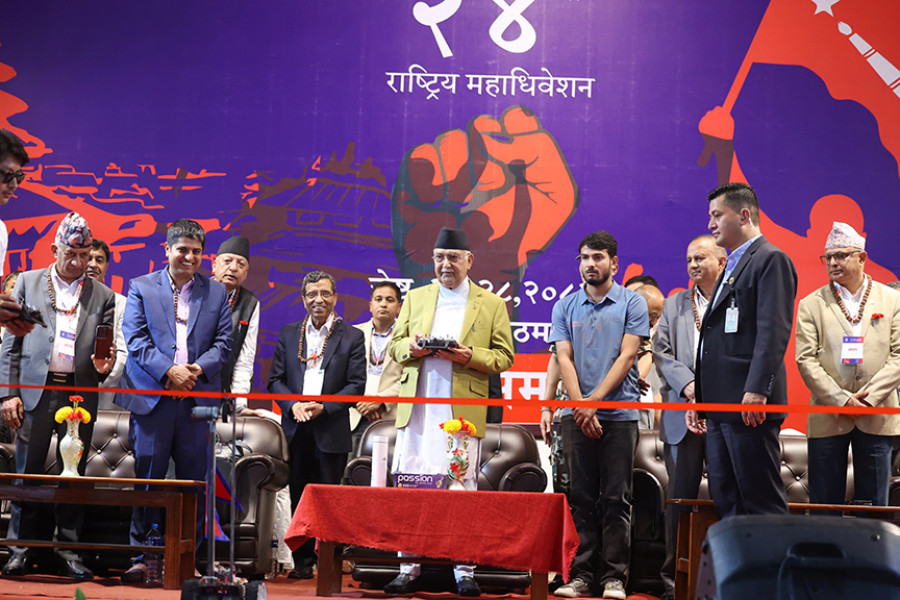Politics
Poll today to elect UML student body leadership
Despite party chair KP Sharma Oli’s directive to build consensus, the UML-aligned union has decided to go for a vote.
Post Report
After setting an age limit of 32 years, the 24th national congress of the CPN-UML-aligned All Nepal National Free Students Union (ANNFSU) is set to hold elections—going against the wish of party chair and Prime Minister KP Sharma Oli.
Despite Oli's directive to select the leadership through consensus, the student organisation has decided to proceed with elections to choose its leadership.
The ruling UML’s secretariat meeting on May 25 decided to introduce the age limit for participants of the general convention of its student wing.
While the secretaries on the previous working committee are competing in the general convention for the union chair, office bearers above the secretary level are barred from competing on age grounds.
ANNFSU will hold the election on Wednesday to choose its leadership.
Elections are being held for 9 office bearers, 40 secretariat members, and 102 central members in the ANNFSU. Similarly, elections are also being held for 13 members for each of the Accounts Commission, Election Commission, Disciplinary Commission, and Policy Planning and Research Commission.
Before the convention, which began on Sunday in Kirtipur, Prime Minister Oli had summoned student leaders, including former presidents of the ANNFSU, to Baluwatar on June 5, urging them to select the leadership through consensus. Oli reiterated the message while inaugurating the convention.
During the 10th general convention of the UML’s Youth Association in Pokhara in May, attempts were made to select the leadership in consensus. However, after the youth leaders revolted against the party’s decision, a vote was held, which re-elected Kshitiz Thebe as the youth organisation’s chief for a second time.
However, as one election after another is being planned in sister organisations despite Oli's wish, political experts interpret this as a sign of Oli’s declining influence.
“The recent incident is a clear sign that Oli, once an invincible leader of the UML, is losing his grip on the party," said Krishna Pokhrel, a professor of political science.
The presidium formed to ensure the success of the general convention on Tuesday proposed the name of the Sujan Kadariya for the ANNFSU leader based on consensus. The praesidium was led by Bhanu Bhakta Dhakal, the head of the party’s organisational department, and comprises former ANNFSU leaders Madhav Dhungel, Ain Singh Mahara, Kishor Bikram Malla, Nabina Lama and Sunita Baral. The student leaders, however, rejected the presidium's proposal for the leadership.
While Kadariya was proposed for the chair, Prakash Paudel and Anjana Shiwakoti for vice-chair, and Dipak Dhami for general secretary were named for unanimous selection. All four individuals mentioned above are vying for the post of chair.
Meanwhile, another chair candidate, Aarati Bhattarai, had said earlier that if the leadership were to be picked in consensus, she would not stake her claim to the chair and would instead opt for the general secretary.
After Kadariya's name was proposed for the ANNFSU chair, there was a burst of opposing voices in the convention hall. After the chanting of slogans, the election committee published the election schedule.
“We have already rejected the party leadership’s call to select the ANNFSU leadership through consensus. We will now proceed with the elections to select the leadership,” said Paudel, a candidate vying for the organisation chief.
At the ongoing 24th general convention, five individuals have announced their candidacies for the leadership position.
Ain Singh Mahara, a member of the praesidium, said that the election in the student body should not be interpreted as the party chair losing his grip on the party organisation.
Mahara also argues that it is not wrong for any organisation’s leader to advocate for sister wing leadership selection in consensus. “This is a natural course of action for the guardian of any organisation,” he said.
“However, if the sister organisation deems elections as appropriate for new leadership, that should not be viewed as the party chief’s loosening grip on the party.”




 21.12°C Kathmandu
21.12°C Kathmandu














